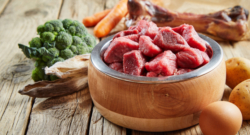
DogFoodAdvisor is reader supported See how
Dog Food Advisor is 100% impartial and is never paid to promote any brand. But if you buy using links on this page, we may earn a referral fee.
Are dogs carnivores or omnivores?
This question has sparked much discussion among pet parents and experts alike. While many people assume that dogs are strict meat eaters due to their ancestral link to wolves, recent research shows that dogs are not exclusively carnivores and can even thrive on a plant-based diet. 1
However, the topic is not black and white. So we’ll try to unpack it for you.
Dogs’ evolution from their wolf ancestors has included changes not just in behavior but also in diet. Although wolves are considered carnivores, domestic dogs have adapted to digest a variety of foods, including carbohydrates and vegetables. Despite this, some pet food companies have marketed meat-based diets by capitalizing on a dog’s wolf lineage, leading to confusion about what dogs can and should eat.
Most commercial dog food contains a balanced blend of meat, carbohydrates, and vegetables, offering a convenient and affordable way to meet your dog’s nutritional needs. However, studies have shown that many dogs can also do well on a vegetarian or plant-based diet, further challenging the idea that dogs are strict carnivores.
Ultimately, dogs are best described as “carnivorous omnivores”. But what exactly does this term mean?Let’s break down the difference between carnivores, omnivores, and how your dog fits into the picture.
 Raw Dog Foods”>
Raw Dog Foods”>
What is a carnivore?
Carnivores, in animal kingdom terms, are animals that mostly eat meat. Their food and energy supply derives from animal tissue. Carnivorous plants also exist but that’s a whole other story.
What is an omnivore?
Omnivores are animals that obtain energy from both meat and plant sources. There is not a particular percentage or preference for how much meat or vegetation an omnivore eats, they usually eat whichever is available to them.
You might have also heard the terms ‘obligate carnivore’ or ‘facultative carnivore’ so let’s break them down too.
What is the difference between an obligate carnivore and a facultative carnivore?
Obligate carnivores, such as cats, rely entirely on meat for their nutrition and cannot survive without it.
Facultative carnivores can digest and derive some nutrients from plant-based sources, in addition to meat. However, while they can process plants, they still require animal-based foods to maintain optimal health.
So, are facultative carnivores the same as omnivores? Not quite.
They are similar but the key difference is that omnivores can thrive on either a plant-based or animal-based diet or a combination of both, whereas facultative carnivores still rely primarily on meat for their overall health.

What is a carnivorous omnivore?
A carnivorous omnivore is an omnivore which has an evolutionary adaptation for eating meat. Dogs, for example, retain features such as sharp teeth and down-jaw movement showing a predisposition for meat consumption. However, their evolutionary adaptation and domestication mean they can thrive on plant or animal ingredients.
So, are dogs 100% carnivores?
Although science heavily suggests that dogs are natural meat eaters, it’s not as simple as that. You might have been told that dogs are indifferent omnivores with no natural preferences, or that they’re strict carnivores with an innate aversion to eating fruits and vegetables. Well, we’ve got news for you…
Do dogs naturally eat meat?
All scientific evidence indicates that dogs have a natural carnivorous bias. DNA studies suggest that domestic dogs evolved from the timber wolf around 15,000 years ago, which may explain this.
However, while domestic dogs retain some carnivorous traits, they are not wolves or wild dogs. Over time, domesticated dogs have developed distinct differences in behavior, metabolism, and anatomy. For example, dogs possess a hyper-sociability gene that wolves lack and their physiology no longer fully supports a strict ancestral wolf diet.
It’s also worth noting that wolves have been observed eating plants, and modern genetic research 2 has identified ten canine genes involved in starch digestion and fat metabolism, highlighting dogs’ significant ability to process carbohydrate-based foods.
Can you see how this gets rather complicated?
A dog’s anatomy is designed for meat consumption in several ways. Here are two key aspects that highlight this:
Sharp teeth
Like all carnivores, dogs have sharp, narrow back teeth and jaws designed for an up-and-down, chopping motion, perfect for cutting meat into smaller pieces.
However, unlike cats — who are obligate carnivores — dogs have a few more molar teeth, allowing them to crush and grind plant material as well.
No salivary amylase
Carnivores do not produce amylase in their salivary glands. 3. Amylase is a specialized enzyme most herbivores and omnivores produce in their saliva. It helps to break down starchy carbohydrates into simple sugars before they enter the stomach.
Although dogs do produce amylase, the enzyme is added further down the digestive tract, in the pancreas, and small intestine.

Why aren’t dogs carnivores?
Despite this bias towards meat, evidence demonstrates how dogs aren’t strictly carnivores or herbivores, but omnivores. Here are some facts that people use to argue that dogs aren’t carnivores.
Dogs have a longer digestive tract than cats
A big difference between carnivores and herbivores is that herbivores have a longer gastrointestinal tract for eating plants. It can exceed the length of the body by a whopping ten times. Dogs have a longer digestive tract than cats and other obligate carnivores, but shorter than herbivores or other omnivores. This shows the evolution of dogs to eat a greater variety of foods and their omnivorous nature.
Dogs eat plants
There has been lots of research and evidence to suggest that dogs can and do survive on a plant-based diet. 4. But they don’t have to be vegan to benefit from plants. Fruits and vegetables contain important nutrients which can be beneficial to a dog’s health, and most dog food recipes contain these ingredients.

Dogs have evolved to be able to digest plants
Research shows that some modern domestic dogs have genes that have evolved, or adapted, to enable starch consumption and glucose digestion 5, a process needed for the consumption of plants or a vegetarian diet — proving they are omnivores. Dogs have evolved to eat what humans feed them through their domestication, and historically they managed to scavenge from early human settlements. “Dog food” has only become a thing in the last few decades.
Wolves eat plants
Another argument is that since wolves have been found to eat plants, modern dogs must be omnivores, as dogs are ancestors of wolves.6. However, this would only prove that wolves are facultative carnivores, not omnivores. As they eat vegetation for survival, when meat is scarce, not all year round.
Dogs are not wolves
Modern-day domesticated dogs are very different from wolves. Their anatomy and physiology do not support an ancestral/wolf diet, there is DNA evidence of starch digestion, and they can synthesize taurine and vitamin A.
Can dogs be vegan?
While most commercial dog food currently contains meat, there’s a growing consensus that dogs can get the necessary nutrients from a vegetarian or vegan diet, thanks to their evolutionary adaption to omnivorous diets. 7.
Many dogs can thrive on a vegetarian diet, as long as they are formulated to be complete and balanced to AAFCO in the same way that meat-based diets are. Of course, all dogs are different and if you think a meat-free diet would benefit your dog, it’s worth talking to your vet before making the switch.
So, what do dogs eat?
The short answer is, whatever you feed them. The evidence suggests that dogs can eat both meat and plants, as they have evolved from scavengers. Ultimately, a dog will eat whatever is put in front of them on most occasions — they can gorge up to 10% of their weight — but it is important to choose a diet that is tailored to your dog’s nutritional needs and preferences. Some dogs may be picky about their food, while others may need a prescribed diet for health conditions such as diabetes or liver disease.
If you’re unsure about what to feed your dog, the best thing to do is seek advice from your veterinarian or an animal nutritionist.
Final word
The Dog Food Advisor does not accept money, gifts, samples or other incentives in exchange for special consideration in preparing our reviews.
However, we do receive a referral fee from online retailers (like Chewy or Amazon) and from sellers of perishable pet food when readers click over to their websites from ours. This helps cover the cost of operation of our free blog. Thanks for your support.
For more information, please visit our Disclaimer and Disclosure page.
Sources
Article reviewed by
Laura Ward
Pet Nutritionist
Laura studied BSc (Hons) Animal Science with an accreditation in Nutrition at the University of Nottingham, before working for eight years in the pet food and nutrition industry.




